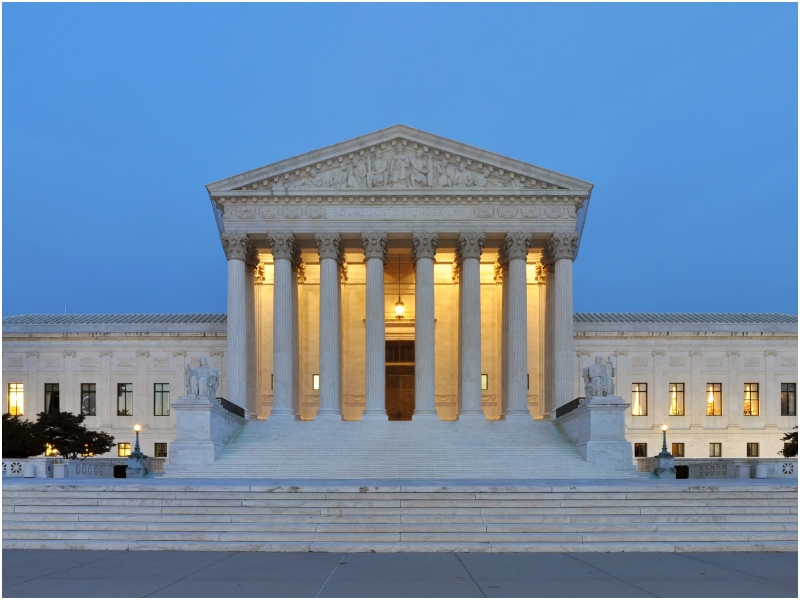The U.S. Supreme Court opened its November argument session today, diving into a pair of high-stakes criminal cases that could reshape federal sentencing guidelines and Eighth Amendment protections for intellectually disabled defendants facing execution.
With the shadow of President Donald Trump’s tariff challenges looming later in the week, the justices focused on technical yet consequential disputes in Rico v. United States and Hamm v. Smith, underscoring the Court’s ongoing scrutiny of criminal justice and capital punishment.
In a session marked by pointed questioning from the conservative majority, the arguments highlighted tensions between statutory interpretation and broader policy concerns, as previewed by SCOTUSblog’s criminal law analyst Rory Little. No opinions were issued today, but the exchanges suggested a Court leaning toward narrowing judicial discretion in sentencing while grappling with the nuances of intellectual disability assessments.

Morning Argument: Rico v. United States – Tolling the Clock on Fugitives?
The first case, Rico v. United States, centered on whether the “fugitive-tolling doctrine”—a common-law rule pausing statutes of limitations for fleeing defendants—extends to supervised release revocations under 18 U.S.C. § 3583(i). Petitioner Rico, who absconded during supervised release for a prior drug conviction, argued that the doctrine should not apply post-sentence, as it would indefinitely extend federal oversight without explicit congressional authorization.
Rico’s counsel, ably assisted by amicus briefs from the ACLU, contended that applying tolling here transforms a finite supervision period into a perpetual trap, violating due process and echoing the Court’s skepticism toward expansive prosecutorial tools in United States v. Haymond (2019).
“Congress chose a five-year cap for a reason,” counsel urged, warning of disparate impacts on low-level offenders in over-policed communities.
The government countered that tolling is essential for accountability, aligning with the statute’s plain text and the Court’s precedents like United States v. Montalvo-Murillo (1990), which upheld similar pauses in pretrial contexts. Solicitor General Elizabeth Prelogar emphasized practical realities: “Fugitives don’t get a free pass just because their release clock ticks on.” She highlighted data showing thousands of annual absconders, arguing non-tolling would incentivize evasion.
Justices’ leanings emerged early. Chief Justice John Roberts and Justice Neil Gorsuch—swing votes in last term’s Hewitt v. United States sentencing case—probed the government’s reliance on common law, with Gorsuch musing, “This feels like judicial alchemy turning statute into eternity.” Justice Clarence Thomas appeared unmoved, questioning why absconding shouldn’t reset the clock entirely. Liberals Sonia Sotomayor and Elena Kagan pressed for limits, citing equity concerns, while Justice Brett Kavanaugh signaled support for tolling’s “common-sense” application. The hour-long argument left the doctrine’s future in supervised release uncertain, with analysts predicting a 5-4 affirmance favoring the government.
Afternoon Argument: Hamm v. Smith – Defining Intellectual Disability in Capital Cases
Shifting to the death chamber, Hamm v. Smith (Docket No. 24-872) revisited the methods for evaluating intellectual disability under Atkins v. Virginia (2002), which bars executing the intellectually disabled as cruel and unusual punishment. Alabama death-row inmate Joseph Clifton Smith challenged the state’s rejection of his claim, based on IQ scores hovering around 70 and adaptive functioning deficits, after a federal appeals court deemed him eligible for relief.
Smith’s team, backed by the NAACP Legal Defense Fund, argued that Alabama’s rigid “clinical definition” standard—requiring deficits before age 18—ignores modern diagnostic flexibility from the DSM-5 and AAIDD guidelines. “Atkins promised protection, not a time-barred trap,” counsel asserted, pointing to Smith’s traumatic childhood and lifelong struggles as evidence of disability manifesting later. They urged the Court to adopt a holistic, totality-of-circumstances approach, potentially sparing dozens on death row nationwide.
Alabama’s solicitor general defended the cutoff as grounded in Atkins and Moore v. Texas (2017), insisting post-18 evidence risks “revisionist history” that undermines finality in capital cases. “We can’t litigate IQ from the grave,” she quipped, citing resource strains on states with over 2,300 death-sentenced inmates. The state warned that broadening definitions could invalidate convictions, echoing conservative critiques in Moore‘s dissent.
The bench showed fractures along ideological lines. Justice Samuel Alito, dissenting in Moore, grilled Smith’s counsel on “slippery slopes,” suggesting the claim resembled a “get-out-of-execution-free card.” Justice Amy Coney Barrett sought clarification on evidentiary burdens, hinting at sympathy for clinical rigor. Conversely, Justice Ketanji Brown Jackson invoked equity, noting, “These standards were made for people, not pedants,” while Sotomayor highlighted racial disparities in disability assessments. Roberts appeared to mediate, focusing on remand possibilities. With Atkins at 23 years old, the argument evoked last term’s heated Glossip v. Gross debates, positioning the case for a potential 6-3 ruling clarifying Atkins‘ implementation by June 2026.
Broader Implications and the Week Ahead
These arguments arrive amid a November docket heavy on criminal matters—over half of the 11 cases involve sentencing or constitutional rights, per SCOTUSblog. A win for the government in Rico could expand federal leverage over probationers, while a broader Hamm standard might commute sentences in states like Texas and Florida, where Atkins claims have surged post-Moore.
Looking ahead, the session escalates Wednesday with tariff challenges testing Trump’s executive authority under the International Emergency Economic Powers Act (IEEPA), following lower-court blocks on his global levies. Trump, who mulled attending but ultimately demurred, faces a conservative Court that has bolstered presidential powers but may balk at unchecked trade wars generating $118 billion in 2025 customs revenue. Other highlights include transgender sports bans (November 4) and agency removal fights (November 5).
Transcripts and audio are available at supremecourt.gov, with full previews on SCOTUSblog. As the Roberts Court navigates Trump’s agenda and criminal reform fault lines, today’s hearings reaffirm its role as the ultimate arbiter of law’s human stakes.
This story draws on official Court records and analysis from SCOTUSblog and Reuters. For docket filings, visit supremecourt.gov/docket.

